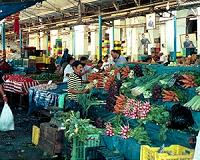 |
Ottawa (UPI) Feb 25, 2011 The Canadian government is considering requests to allow genetically modified fish and pigs, but the public may never hear of their decision, critics say. Groups have applied for permission to produce fish that grow twice as fast as normal, and pigs with mice DNA spliced into them, but Health Canada says it cannot publicly acknowledge the requests, Quebecor Media Inc. reported Friday. "For confidentiality reasons, Health Canada cannot confirm whether or not a submission has been filed or any other information related to a submission," Jenny Van Alstyne, spokeswoman for Health Minister Leona Aglukkaq, said. AquaBounty, a firm with Canadian and U.S. operations, says it is working on developing genetically modified salmon, trout and tilapia, which will grow faster than traditional fish. The application for a genetically modified pig comes from the University of Guelph in Ontario, where researchers spliced DNA from mice into Yorkshire pigs to reduce the amount of phosphorous in the pigs' manure. The researchers say the reduced phosphorous could mean less pollution in rivers and streams near large-scale pig farms. Opponents of genetic modification say that under current regulations, there would be no requirement to tell the public the animals they are eating are anything other than a regular fish or pigs. "Consumers have a right to know what they are eating," said Parliament Member Alex Atamanenko of the opposition New Democratic Party agriculture and a food security critic. "I think it would be a travesty if the government would allow this to happen without letting consumers know what they are eating."
earlier related report A research team led by scientists from Penn State University and University of New Hampshire conducted a four-year study examining the impact of reduced-tillage and cover crops managed for hay and forage production on the agronomic and economic performance of feed grain production. Two cropping system experiments were carried out in central Pennsylvania from 2003 to 2007. For the first year both plots rotated between a cover crop, corn and soybeans; one plot was managed with full tillage and the other with reduced tillage. Changes in weed populations, crop yields, and economic returns over the three year rotation were monitored by the research team. From a weed management perspective, the results indicate that utilizing reduced tillage for organic production could present a challenge for some farmers. Weed populations were less responsive to the choice in cover crop than to the reduction in tillage. Weed populations dramatically increased in reduced tillage systems. "This is a troubling result because the weed populations that increased included perennial species such as Canada thistle and bindweed which are very difficult to control without tillage once they become established. In a way, these perennial weeds can actually act as 'management drivers,' forcing organic growers to have to periodically utilize more intensive tillage practices to reduce their populations," says Richard Smith, University of New Hampshire. The study also suggests that growers who want to transition to organic production while minimizing tillage may experience variable economic success depending on how they begin their rotation. Costs associated with manure and compost, which was purchased off-farm, also strongly influenced the economics of the systems. The authors conclude that integrated systems that include field crop and dairy production, where manure sources are available on-site or locally, would improve the economics of these systems. While tillage did not have a significant effect on cumulative net returns in either experiment, there did appear to be a trend for higher returns in the rotations that utilized full-tillage. According to Smith, further research will be necessary to determine the most cost-effective approaches to reducing tillage in transitional and organic production systems. Research is ongoing at Penn State University.
Share This Article With Planet Earth
Related Links Farming Today - Suppliers and Technology
 High food prices threaten seething Mideast
High food prices threaten seething MideastCairo (UPI) Feb 25, 2011 As if the Middle East wasn't battered enough by political turmoil, analysts say the region is likely to be hit by rising food prices - one of the problems that triggered the unrest. The political tempest that has unseated two presidents and is expected to see the downfall of a third could well be fueled by the rising oil prices that it has engendered. Oil prices have climbed pas ... read more |
|
| The content herein, unless otherwise known to be public domain, are Copyright 1995-2010 - SpaceDaily. AFP and UPI Wire Stories are copyright Agence France-Presse and United Press International. ESA Portal Reports are copyright European Space Agency. All NASA sourced material is public domain. Additional copyrights may apply in whole or part to other bona fide parties. Advertising does not imply endorsement,agreement or approval of any opinions, statements or information provided by SpaceDaily on any Web page published or hosted by SpaceDaily. Privacy Statement |